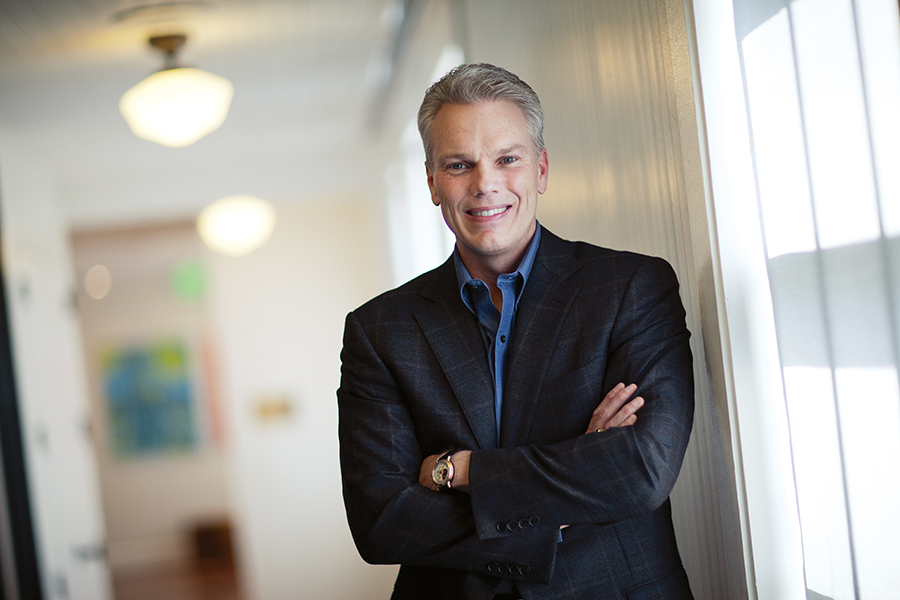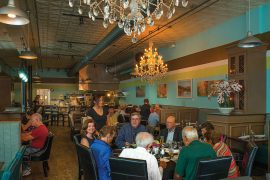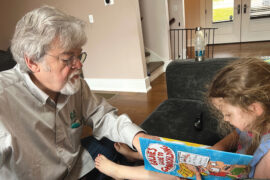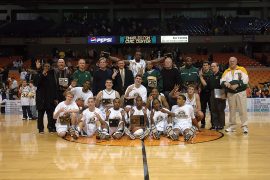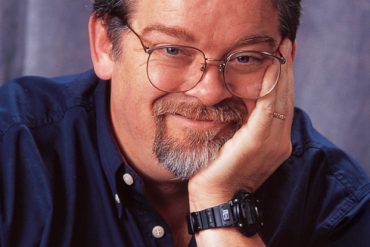Kenova native Brad Smith may be the president and CEO of software giant Intuit, but he has never forgotten his small town roots in West Virginia.
By Jack Houvouras
HQ 91 | AUTUMN 2015
In the heart of Silicon Valley lie some of the most powerful and profitable companies in the world – Apple, Google, eBay, Intel, Hewlett-Packard, Oracle. Here, young workers clad in jeans, T-shirts and hiking shoes roam the high-tech office complexes. You won’t see anyone clutching a leather briefcase. Instead, rumpled backpacks and well-worn messenger bags are the norm. Sometimes it’s hard to tell the employees from the top executives.
Brad D. Smith, the 51-year-old president and CEO of Intuit, fits right in. Strolling the labyrinth of hallways in Building 7 of the company’s sprawling campus, he’s dressed in gray slacks, a navy blue argyle sweater and a plain white T-shirt. But, for the leader of the software giant that makes Quicken, QuickBooks and TurboTax, there is one thing that distinguishes him from his army of employees – his accent. That West Virginia drawl is unmistakable.
“In Silicon Valley there are things called features and bugs,” Smith explains. “If a product does what a customer wants, it’s a feature. If it doesn’t, it’s a bug. I learned early on that my accent was a feature and not a bug. When I would speak people would ask, ‘Who was that guy with the twang?’ I stuck out in the crowd, and that was a good thing.”
At the start of Smith’s career at another major corporation, one of his bosses didn’t quite see it that way. Troubled by his West Virginia accent and how it might hinder his advancement within the company, he advised Smith to enroll in speech classes that would defuse his dialect.
“It didn’t work,” Smith says with a smile. “You know, it’s funny. I think it helped me learn an invaluable life lesson – to be authentic to who you are.”
Authentic. That, in essence, is what has defined the professional ascent of Brad Smith. To this day, he cites the lessons gleaned from his family, teachers and community as the keys to his success. And while his career has taken him across the country and around the world, he has never forgotten his roots that started in a small town in West Virginia.
• • • • •
Born in Huntington, West Virginia, Smith grew up in nearby Kenova, a humble and hard-working town of 3,500 people. From an early age, the community played a key role in his life.
“I was 6-years-old at the time of the Marshall University plane crash. I still remember looking out the window of our home and seeing the mountain glowing red,” Smith recalls. “My cousins were volunteer firemen for the Kenova Fire Department, and our neighbors had a police scanner. We heard everything that was going on that night.”
His father worked for Nestlé for 26 years before becoming mayor of Kenova, while his mother stayed at home to raise Brad and his two brothers.
“I couldn’t have wished for better parents,” Smith says. “Even though he was busy, my dad would grab moments of time and teach me life lessons. He was the provider and the teacher. My mom was the nurturer and the protector. There was no question that we were loved.”
Smith attended Ceredo-Kenova High School, where he played football until his sophomore year when he decided to dedicate his time to studying martial arts. By the time he was a senior he had earned his black belt. The discipline he had mastered would continue to impact his life for years. As Smith recently told The New York Times, “Soon after, I was teaching an entire school, with about 150 students. You get measured on the progress of the students you’re teaching. It’s no longer about your own abilities; it’s about building the capability in others. I fall back on that to this day.”
Smith’s roots in Kenova are something he continues to recall with fondness, even when he speaks to large audiences around the nation.

“Kenova was an idyllic setting. It truly was the perfect small town and I thought I had everything I’d ever want or need,” he explains. “My neighborhood friends and I would go to Dreamland Pool early every morning and play until our moms whistled for us to come home. On Friday nights you could smell the popcorn in the air and hear the bass drum of the marching band at the football games. Everybody in town was friends and helped raise each other’s children.”
Following high school, Smith was accepted to the U.S. Military Academy at West Point, but after one semester he decided to return to his roots and enroll at Marshall.
“Marshall was pulling me back home,” Smith explains. “But attending West Point was a wonderful experience because it helped me understand very early in life that you need to follow your heart. In the end, Marshall gave me everything I was looking for in an education. I think Marshall is one of the best kept secrets in America.”

In 1986, Smith earned a bachelor’s degree in business administration with an emphasis in marketing. He says the memories from his time at Marshall will last a lifetime.
“I formed some longstanding friendships at Marshall, not to mention the football team had its first winning season since the plane crash,” he recalls. “In the classroom, one of my favorite professors was Dean Robert Alexander. Dr. Michael Boudreau was another favorite. I loved his class on marketing and advertising. He was very hard, and he pushed me. Dick Jones taught distribution management, and I loved him because he was very pragmatic. He talked about the ‘detail of retail’ and the ‘blocking and tackling of execution,’ which I use to this day. Last, but certainly not least, was Dr. Chong Kim. He was a role model for me in many ways because he was also a martial artist. He lived a very honorable life. I connected with him both intellectually and spiritually.”
Eventually all three Smith brothers would earn their degrees from Marshall Some years later their father gathered his sons together and presented them with gifts he had picked out himself.
“My dad received his GED before joining the Army,” Smith says. “He and my mom had a dream that their three sons would all go to college. One Christmas morning my dad announced that he had a surprise. He then gave each of us a class ring from Marshall.”
Smith then pauses for a moment before continuing.
“A few days later my dad passed away of a heart attack. He was 58. My brothers and I wear these rings every single day, not only for Marshall, but also for our parents and the sacrifices they made on our behalf.”
• • • • •
Smith’s first job after graduating was at Pepsi, where he began his quick ascent up the corporate ladder. He found immediate success working in sales management and business development for the soft drink giant. He moved several times for his job before landing in Grand Rapids, Michigan, where he attended night classes and earned his master’s degree in management from Aquinas College. He eventually left Pepsi and went on to excel at ADVO, the largest direct mail marketer in America, and at ADP, one of the world’s largest providers of business outsourcing solutions.
Then, in 2003, Intuit found him. What resulted was a five-year rise within the company that was unprecedented. He started out working in Plano, Texas, running the accountant relations portion of the professional tax business. He was then asked to move to San Diego to run TurboTax, the company’s flagship consumer tax business.
At Intuit, Smith could be gregarious and amiable but also deadly serious. Years earlier his parents had instilled in him a valuable lesson.
“When my mom or dad walked into the room, the first thing you saw was a smile and the last thing you saw when they left was a smile. But, they told me to never mistake kindness for weakness.”
In 2005, Microsoft declared war on Intuit in an attempt to steal its market share of QuickBooks, the highly popular small business accounting software product. Smith was then dispatched to Silicon Valley to lead the QuickBooks team and help fend off the threat.
“Our culture here at Intuit is to challenge one another,” Smith recalls of that trying time. “I issued a challenge to our employees to beat Microsoft to the market with the next version of our product. They in turn issued a challenge to me. They said, ‘If we reach our goal then you have to swim in the pond outside the office building in a 1920s bathing suit. They delivered their end of the bargain, and I did as well.”
Since then he has dressed up as a Roman soldier, a cowboy, a sheriff, a NASCAR driver and even Elvis Presley. If his team does great work, then he’s happy to indulge them.

“People get motivated by different things,” Smith says. “Starting with our founder, there are no tremendous egos here. A lot of people are doing more important work than me every day in this company. So I have no problem putting on a costume if it shows that leaders are just normal people.”
• • • • •
In 2008, just five years after joining Intuit, Brad Smith’s entire world changed when the board of directors named him CEO. He was only 43-years-old when he was asked to take charge of a global entity with 8,000 employees and annual revenues of $2.6 billion at the time.
Asked about the secret to his success at such an early age, Smith remains characteristically humble.
“I surround myself with people smarter than me, honest to goodness,” he insists. “And I help those people understand that life is a team sport. If I have a philosophy it’s this: A player that makes the team great is always better than simply a great player. My job is making sure there are very talented, smart people who clearly understand what success looks like, and then I work hard to remove any barriers that get in their way. Period.”
But there’s more to it than that. Like many of the people who work in Silicon Valley, Smith is extraordinarily bright, bold and innovative. He possesses the kind of charisma that endears him to both coworkers and board members. And he is always striving for new ways to lead and will go to any length to inspire his workers.
Another key to Smith’s success is his willingness to seek out advice from other accomplished leaders. After he was named CEO of Intuit, the first thing he did was call A.G. Lafley, the CEO of Procter & Gamble, to ask for some pointers. As a Silicon Valley heavy-hitter, Smith has rubbed elbows with such luminaries as Apple’s Steve Jobs, Google’s Eric Schmidt, eBay’s John Donahoe, HP’s Meg Whitman, venture capitalist John Doerr and more. He has learned from all of them.
One of the new management strategies that Smith implemented after taking the reigns at Intuit was unstructured time. He learned about the concept from his friends across the street at Google. In essence, employees can use 10 percent of their time to work on any project they choose.
“The premise is that people who focus on things they love will work harder and get more done. We’re looking for great ideas that will improve our workers’ skills and efficiency. We’re also hoping to foster innovation – if someone has an idea for a new product that our customers would love, then we encourage them to go for it.”
Since introducing unstructured time, Intuit has seen more than 200 initiatives go to market resulting in $100 million in new revenue.
Another one of Smith’s strategies was to focus more on the design of the company’s products. His goal: to overcome the perception that financial software is boring and dull. To that end, he bolstered the number of Intuit’s designers by 600 percent. Taking the concept one step further, he reconfigured the layout of the office buildings. Today there are fewer cubicles and more open spaces for collaboration.
“The number one reason people use our products is ease of use. Early in my tenure I set a long-term goal: By 2020 Intuit will be considered one of the most design-driven companies in the world.”
The changes are already paying dividends – the company’s phone service reps are receiving 24 percent fewer calls from confused users.
Today, Intuit is ranked #31 by Fortune magazine as one of the “100 Best Companies to Work For.” Its products are sold in 160 countries and have been translated into more than 10 languages. The company has offices in the United States, as well as Singapore, India, France, Brazil, Israel, England, Australia and Canada. Smith is focused on worldwide expansion and translating Intuit’s accounting software into more languages. To that end, Intuit has teamed up with Google, Wikipedia and other renowned companies to learn how to bolster its global presence.
“We have annual growth overseas of 135 percent. It’s really the shift to the Cloud and mobile that’s helping our global expansion,” Smith explains.
But no matter how far his work and travels take him, Smith says he will never forget his strong ties to the Huntington area and Marshall University. Sitting in his corner office where a framed We Are Marshall movie poster hangs behind his desk, Smith cites the character of both the school and community as something that inspires him every day.
“Marshall has a sense of purpose and values that I love. Look at what it has accomplished since the plane crash. Champions aren’t defined by whether they hit the canvas, but by how quickly they get back up. Marshall University just perseveres. It’s a university that has been hit with tragedy and fought its way through, and it just keeps coming back. And I think that is the secret to life.”
Recently, Smith was a featured speaker at the 2015 West Virginia Chamber of Commerce Annual Meeting and Business Summit held at The Greenbrier. He captivated an audience of 800 with the story of his success and referenced a song by Miranda Lambert that best conveys his feelings about West Virginia.

“It’s the house that built me,” he told the crowd. “I haven’t left home; I have always remembered West Virginia because it taught me the most important lessons. Growing up in Kenova taught me integrity. It taught me humility. And it taught me teamwork.”
Smith also addressed the challenges facing West Virginia and offered several solutions. He cited Ireland as an example of an economy with similar problems as the Mountain State.
“The problems here are not unique to West Virginia. Ireland for decades struggled with poverty, rampant unemployment and substance abuse, and they set out to actually re-imagine themselves by focusing on education and technology,” he explained. “They are now known as the Celtic Tiger and are one of the fastest-growing countries in the European Union. When I was in Ireland I kept thinking, ‘This place is like West Virginia.’ I felt like I was home. The people were incredibly kind and they have strong work ethics.”
Smith went on to explain how technology can change lives.
“We are experiencing one of the most transformational changes that has ever happened to a generation. We are living in a global economy powered by this thing called the Cloud, with computers in the palm of our hand hundreds of times more powerful than the one that landed a man on the moon. We have to learn to adapt and change.
Smith then detailed what needed to be done to transform West Virginia.
“Our schools and universities must focus on STEM – science, technology, engineering and mathematics,” he said. “Our students need to enroll in coding boot camps that, in two months, can teach students how to write code.”
Smith noted that while the state’s mountains have been a hindrance to moving goods and services in the past, the world is evolving and West Virginia must seize new opportunities.
“Today our world is in the Cloud. West Virginia must build a broadband network across the entire state. If we don’t, we will be left behind,” he asserted to loud cheers from the audience.
Smith closed his remarks about the future of West Virginia by stressing the importance of entrepreneurship.
“Entrepreneurship is the backbone of America’s economy. Small businesses employ 60 percent of America’s workers and create eight out of 10 new jobs. It used to be that eight out of every 10 college graduates wanted to work for a large corporation. Today, eight out of every 10 college graduates want to work for themselves. They want to be the next entrepreneur like Larry Page and Sergey Brin at Google, or Mark Zuckerberg at Facebook. This is the millennial mindset. I think if we could breed entrepreneurism that would be our single biggest opportunity in West Virginia. Our topography broke the backs of the pioneers, but not the people who settled here. We learned how to overcome adversity, but we have to become a different version of ourselves if we’re going to take our place in the future.”
• • • • •
Living in California, Smith says every native West Virginian he meets is trying to find a way to come home. Smith shares those sentiments. Even though his work schedule keeps him immersed, he still finds time to make it home at least twice a year.

“I love the Huntington area,” Smith explains. “There is this pride in Huntington, Kenova and Marshall University that is different from many of the places I’ve been. When I’m in town I’ll often speak to a class at Marshall. And if a Marshall grad is in northern California they’re always welcome at Intuit. I never say no to Marshall, ever.”
Asked what advice he might give Marshall students who wants to be the CEO of their own company or a major corporation, Smith offers four suggestions.
“First, be true to yourself and focus on being the best you can be. Second, always speak the truth as you know it. If you have a point of view, don’t be afraid to share it. Third, stay focused on the outcome. Often success comes down to who’s willing to sign up for the hardest, gnarliest task and get results. And fourth, preserve the relationships around you. Life is a team sport.”
Beyond his grueling work schedule, Smith says his wife of 23 years and their two daughters are the center of his life. His wife, Alys, is an attorney whom he met on a blind date. Their older daughter, Payton, is a junior at the University of South Carolina, while their younger, Devon, is a freshman at Ohio State.
He remains close to his mother and two brothers.
“My mom still lives in the same house I grew up in. I can always count on unconditional love and support from her, just as she has shown me every day since I was born. My older brother, Brent, is the smartest person I’ve ever met. Even today as a CEO, if I need advice I go to him. My younger brother, Larry, is the toughest individual I know, but with a heart of gold.”
Smith’s interests outside of work and family include fitness (he’s a P90X workout devotee), playing the guitar and saxophone and writing. He’s also a voracious reader of anything about leadership or history. His favorite charities are those aiding young children with special needs and those advancing educational programs, such as Donor’s Choose.
• • • • •
When Brad Smith took over as Intuit’s CEO in 2008, the stock price was $30 and annual sales were $2.6 billion. Today the stock is trading at nearly $90 and annual sales have reached $4.5 billion. That West Virginia drawl doesn’t seem to have stymied his career after all.

The story of Smith’s meteoric rise is certainly impressive, but through it all he has remained humble and authentic. When asked to give speeches around the nation, he begins by explaining that he hails from a small town in West Virginia and is a proud graduate of Marshall University.
“I sit at dinners next to people who went to Harvard, Yale, Oxford, Stanford and every once in a while, after they’ve had a couple glasses of wine, they will cozy up to me and ask how I think my education from Marshall University stacks up,” he explains. “I smile and tell them, ‘I learned everything you learned in school, but mine cost $150,000 less and our football team was better.’ ”
His achievements in Silicon Valley have only recently garnered the attention of the folks back home.
“Brad Smith exemplifies everything that is good about West Virginia and Marshall University,” notes Gary White, interim president at Marshall University. “Not only is he an inspiring leader for one of the world’s most exciting companies, he is generous and humble and everything his parents raised him to be.”
For Smith, working in Silicon Valley has been the culmination of a journey marked by hard work, humility, authenticity, discipline and vision. But, he does admit there is one negative to the path he has taken, and it is summed up best on his personal Facebook page: “Just a small town boy who spent 22 years looking for a way to get out and the rest of my life looking for a way to come home.”

